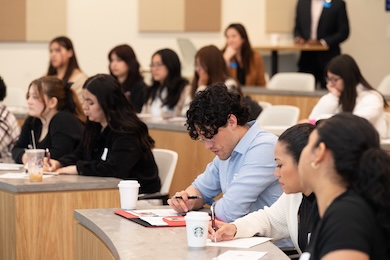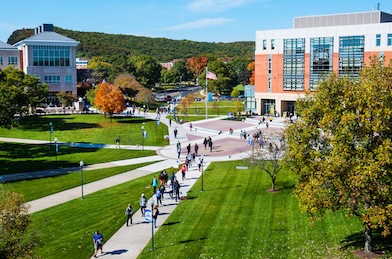Interest pathways provide a checklist of suggested courses that can help you learn more about a particular topic or career you're interested in. They consider the requirements for the major and offer a roadmap of course suggestions to help you develop specific skills and knowledge for a certain career or field of study.
This pathway is all about embracing the wide range of studies the CMS program has to offer. It's a perfect balance between communication, media, and screen studies, giving you the chance to focus on what interests you most. Not only that, but you will also learn a mix of practical skills and critical/theoretical approaches that will benefit you in the professional world.
The Advertising and Public Relations pathway is best suited for students interested in strategic communication, creative messaging, and brand management within the advertising and public relations industries. Throughout the program, students will learn essential skills for the field and gain practical experience in crafting compelling copy, designing captivating visual content, and executing strategic communication campaigns across various media platforms.
Our specialized communication program is designed to equip individuals with the essential skills for effective communication in both organizational and interpersonal settings. The program focuses on cultivating a deep understanding of communication dynamics within teams, workplaces, and personal relationships. Graduates of the program will emerge with a heightened ability to navigate complex communication scenarios, fostering positive relationships, and contributing to the overall success of their organizations.
Explore our Media Studies and Media Literacy pathway within the Communication, Media, and Screen Studies program to delve into the intricate world of media communication. Develop a deep understanding of media analysis, critique, and literacy, honing your skills in decoding and evaluating media messages. Gain hands-on experience in digital media production, research, and scholarship, preparing you for a variety of roles in media-related industries. Whether you aspire to be a media researcher, digital content creator, or media advocate, this pathway equips you with the knowledge and expertise needed to thrive in a rapidly evolving media landscape. Unleash your passion for media exploration and make a meaningful impact on how media shapes our society.
The Film, Television, and Media Production concentration within the Communication, Media, and Screen Studies program is designed for students passionate about storytelling through visual and audio media. This concentration offers hands-on experience in film, television, and digital media production, blending creative practice with technical proficiency. Students will gain expertise in areas such as directing, screenwriting, cinematography, video editing, sound design, and post-production. With a focus on both artistic expression and industry-standard practices, this concentration prepares students to bring their creative visions to life across various media platforms.
If You're Interested In...

Careers
Some notable careers addressed by our pathways include:

Academic Study & Grad School
Some specific areas of study include:

Exploring
Some ideas or issues you may be curious about:
Frequently Asked Questions
Are there concentrations in the CMS major?
Yes. All CMS majors must choose between our two concentrations: Communication, Media, and Screen Studies (CMS) and Film, Television, and Media Production (FTMP). These account for the basic requirements in the major, but have different focus areas.
What is the difference between the CMS and FTMP concentrations?
CMS provides a broad and exploratory approach to the major. It focuses on understanding the role of communication and media in society in our daily lives. Students gain theoretical and practical experience in a range of areas including interpersonal communication, advertising and promotion, organizational communication, media literacy, production, and critique. Majors choosing this concentration develop skills in critical thinking; message design; analysis of relationships, culture, and evolving media and technologies; effective collaboration; and verbal, written, and digital communication. CMS classes are offered as a mix of in-person and online modalities. Depending on the combination of courses taken, there can be a substantial amount of group work and/or use of computers for collaboration and design projects.
FTMP is more production-oriented and focuses more on the technical side of content development. Students in FTMP work hands-on with the creation and production of audiovisual content for film, television, and digital platforms. Majors choosing this concentration develop skills in writing, directing, editing, and other aspects of visual storytelling. Most FTMP classes are taught in-person in our production studio and a significant portion of the work for courses is completed in production teams.
Both concentrations have the same number of required credits for graduation (45 total credits).
What is the difference between a concentration and an interest pathway?
A concentration typically refers to a specialized area of study within a degree program and features a definitive list of class requirements…courses you have to take. An interest pathway, on the other hand, is a suggested sequence of courses selected to help students fulfill their degree program while acquiring the knowledge and skills needed to succeed in a particular career or field of study. In other words, the pathways allow for more choices and customization, while concentrations dictate what you must take.
The Communication, Media, and Screen Studies department is moving away from rigid concentrations and instead offering interest pathways because they offer more flexibility for students.
If I am currently declared as a COM or MDS major, can I switch to CMS? If so, will my taken classes count?
Yes, to both questions. All classes from the previous COM and MDS programs will count in the CMS major. The course numbers have changed to the CMS prefix, but Banner automatically tracks those changes. If you are currently a COM or MDS major and would like to switch to the CMS program, please fill out the online request form at: https://forms.office.com/r/qqeGUp8V3T
Are internships required as part of the CMS major?
No, internships are not required. However, we do strongly suggest that majors make an effort to complete an internship before graduation. Considering that our program values hands-on learning, we typically offer class experiences that have a practical orientation. Our Practicum classes provide simulated experiences that provide opportunities for students to further develop career skills. In addition, our capstone-level classes are intended to give majors a chance to demonstrate the skills they’ve learned throughout the program. These experiential opportunities give students a strong foundation for starting their careers upon graduation. When combined with an internship or two, students will have a distinct advantage as they move into the workplace.
What if my interests are different from the listed pathways?
That’s ok! When you meet with your advisor, you’ll be able to discuss your interests and career goals. Together you’ll be able to talk through which pathway might work for you and also how you might customize your course combinations to better reflect your curiosity and goals.
